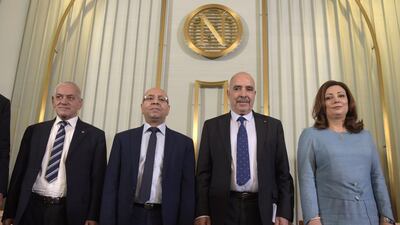TUNIS // Tunisia’s National Dialogue Quartet, an alliance of civil groups who intervened to save the country’s democracy, will receive the ultimate accolade on Thursday when they are presented with the Nobel Peace Prize.
The Quartet – an unlikely alliance of rights groups, lawyers, trade unions and employers – was formed in the summer of 2013 when the country’s parliament was on the cusp of collapse.
They were the surprise winners of the peace prize announced in October, when the Norwegian Nobel committee hailed the Quartet for establishing “an alternative, peaceful political process at a time when the country was on the brink of civil war”.
In the summer of 2013, protests, strikes and terrorism stalked the country, as the parliament failed in its task of producing a constitution by its original October 2012 deadline.
At the same time, dramatic developments were unfolding in other parts of North Africa.
On July 3, Egypt’s then-general Abdel Fattah El Sisi, who later became president, removed the country’s Muslim Brotherhood government with the backing of two million protesters.
In Libya, militias seized key oil ports, triggering a standoff with the government and political chaos that would end a year later in civil war.
Tunisia’s experiment with democracy, meanwhile, was headed for the rocks, as the ruling Troika coalition, led by the Muslim Brotherhood’s Ennahda party, was unable to agree a constitution.
Opposition parties walked out of the parliament in Bardo, a complex of palaces and villas in western Tunis, and protesters gathered outside each day.
“There was a crisis for the democracy, the national assembly was starting to break,” said Fadhel Mahfoudh, head of the Tunisian Bar Association – one of the groups that is part of the Quartet.
The crisis worsened on July 25 when a popular politician and critic of the religiously conservative Ennahda party, Mohammed Brahmi, was shot dead. He was the second high-profile assassination of the year following the killing of leftist leader Chokri Belaid in February.
Spurred by his death, the four groups – the Human Rights League; the Bar Association; the Confederation of Industry, Trade and Handicrafts (UTICA); and the General Labour Union (UGIT) – set aside their past bitter disputes to unite for a solution.
“We could not imagine how they could assassinate someone in Tunisia,” recalled Wided Bouchamaoui, president of UTICA.
She phoned Houcine Abbassi, chairman of the powerful UGIT trade union, who had already met with the leaders of both the Bar Association and the Human Rights League – all of them anxious to save Tunisia’s democracy.
The Quartet produced the Road Map, a plan demanding that parliament produce a constitution, agree on fresh elections, and appoint a new government of technocrats.
“We wanted to move for elections as soon as possible, and end the transition period as soon as possible,” explained Human Rights League vice president, Mokhtar Trifi.
Months of discussion followed, hampered by tensions between Ennahda and a newly formed opposition party, Nidaa Tounes. Many of Nidaa’s members had served under the former dictatorship of Zine El Abidine Ben Ali and were distrusted by Ennahda supporters.
“Our mediation was based on getting consensus, so the hard part was talking every day with all the different parties,” said Mr Trifi.
The mediation continued until January 2014, when Ennahda prime minister Ali Larayedh stepped down and was replaced by a technocrat administration led by an engineer, Mehdi Jomaa.
From that point on, the Quartet’s role ended, the constitution was enacted and trouble-free elections held at the end of the year.
Those elections saw Ennahda and its coalition partners lose power, with Nidaa Tounes winning, and its leader, Beji Caid Sebsi, elected president. For members of the Quartet, the election result was a triumph for democracy.
“We are not needed now, democracy is not threatened, so the Quartet has no role,” said Mr Trifi.
The group’s success has drawn international praise, with Michael Willis, a North Africa specialist at Britain’s Oxford university, saying: “What impresses me about Tunisia is that the political actors seem to walk to the edge of the precipice, then take a step back and start talking to each other.”
foreign.desk@thenational.ae

